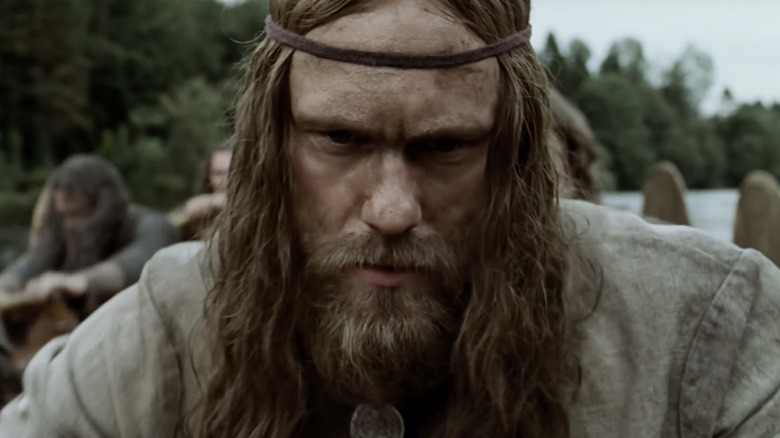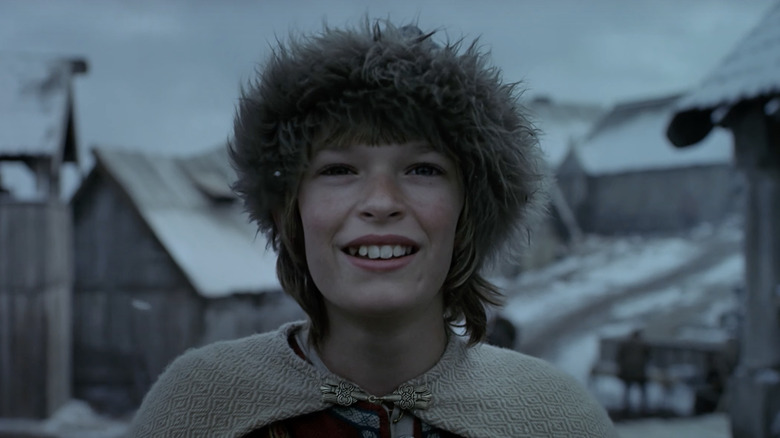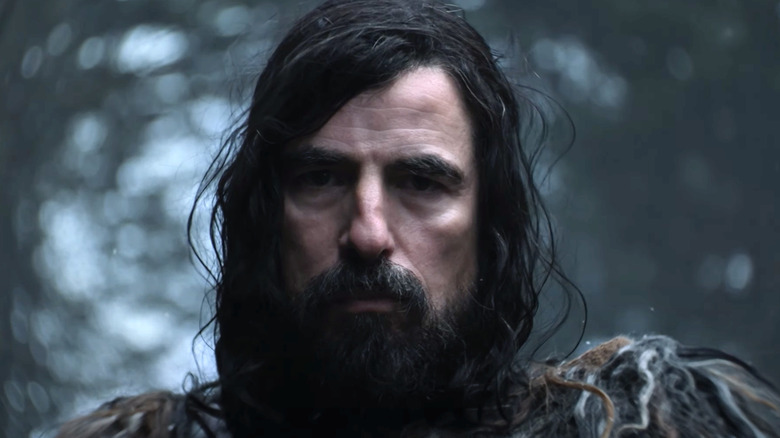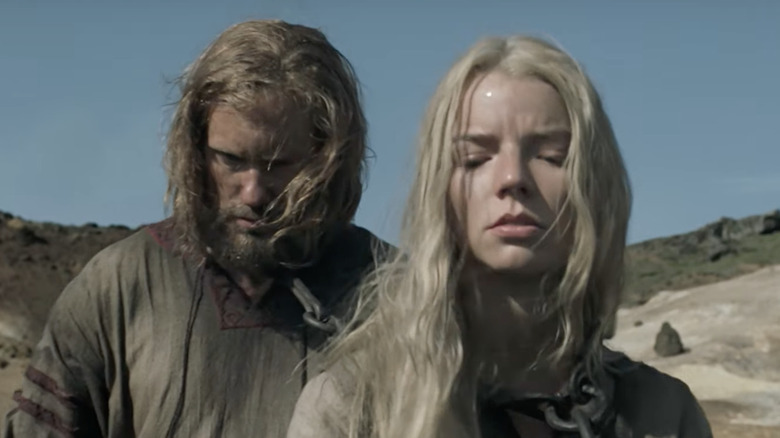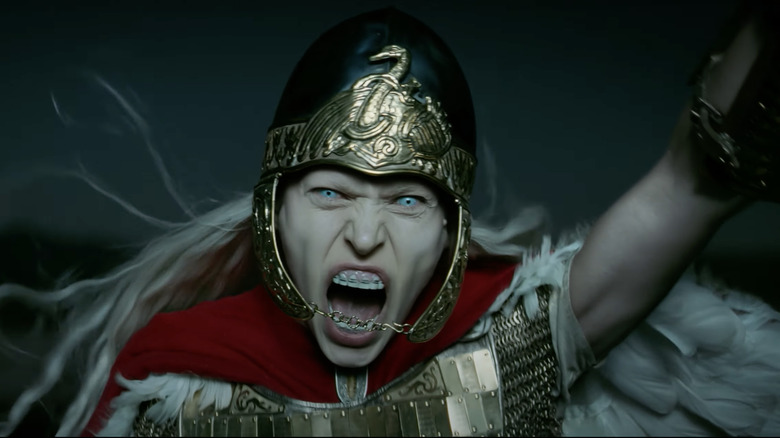The Ending Of The Northman Explained
Acclaimed director Robert Eggers' third feature film takes viewers to 10th-century Europe for a brutally violent and intense revenge drama. With "The Northman," Eggers has upped the ante from his first two features, the eerie colonial New England-set "The Witch" and the intimate, surrealist fantasy "The Lighthouse." The film is his most ambitious project yet and features past collaborators Anya Taylor-Joy, Willem Dafoe, and Katie Dickie, alongside stars like Nicole Kidman, Ethan Hawke, and Alexander Skarsgård, who stars as Prince Amleth.
First and foremost, "The Northman" is a tale of vengeance. If it comes across quite a bit like Shakespeare's "Hamlet," that's because it is "Hamlet" — sort of. The film is based on the same Viking story from the 13th century that inspired the Shakespeare stage play. Largely set in the year 914, "The Northman" tells the story of Amleth, a prince whose father, King Aurvandill (Ethan Hawke), is killed by Amleth's traitorous uncle, Fjölnir (Claes Bang). Amleth vows to take revenge, leading audiences on an odyssey of brutal conflict, Viking warriors, and early Northern European and Icelandic kingdoms.
While the actual narrative of "The Northman" is relatively straightforward and the scope of the movie often resembles a big-budget commercial blockbuster ala "Gladiator," by the time the film reaches its blood-drenched conclusion, we realize that Eggers has achieved something deeper, more specific, and a whole lot weirder than your average historical epic. Here's what you need to know about the ending of "The Northman," and what the movie means for Eggers' career going forward.
Amleth gets his revenge, but not his kingdom
In "The Northman," audiences first meet Amleth as a young boy who idolizes his father King Aurvandill (Ethan Hawke), as well as the kingdom he expects to inherit. That, of course, doesn't go according to plan. Fjölnir's brutal takeover of Aurvandill's kingdom sends young Amleth into exile, and he does not emerge again until years later, now a man and a member of a fearsome Viking tribe. For nearly the entirety of "The Northman," Amleth is guided by three goals — to avenge his father, save his mother Gudrún (Nicole Kidman), and kill Fjölnir (Claes Bang) to earn his vengeance. As an adult, Amleth stops at nothing to achieve these goals as he murders his way through Fjölnir's village in Iceland. Even when it grows clear that he may die in the process, the character embraces the prospect of death from injury on the battlefield as a personal victory that will send him to Valhalla in the afterlife.
Amleth runs the risk of truly losing himself in the process of achieving a goal he set for himself as a child solely in the name of revenge. At one point, Amleth sets aside a necklace given to him by his father so that he can disguise himself as a slave to get closer to Fjölnir, and in that moment, he ceases to be himself. Instead, he becomes a tool of prophetic revenge. Amleth's meetings with the Seeress (Björk) and other visions tell him that his children with Olga (Anya Taylor-Joy) will rule the kingdom that should have been Amleth's in the future — his destiny lies on the battlefield with his uncle.
Fjolnir dies guilty of fratricide and in exile
When Amleth does finally arrive to exact his prophetic revenge, we see that "The Northman" offers a messy conclusion that sets it apart from other vengeance sagas. Amleth doesn't really have a kingdom to return to and take for his own when he does grow up. Although Fjölnir took over Aurvandill's kingdom in a violent uprising, Amleth comes to learn that some time afterward, Fjölnir himself was deposed by another conquering Northern European king and was forced to take refuge in Iceland.
When Amleth travels to Iceland as a slave to find Fjölnir, he is not returning to his own kingdom or, really, any kingdom at all. Fjölnir's domain is just a small village in Iceland where he and Gudrún live with their own son, Gunnar (Elliot Rose), Fjölnir's older son Thorir (Gustav Lindh), and a small grouping of village people and their slaves. Fjölnir has already been humbled by external forces by the time Amleth reaches him, and aside from murdering Aurvandill way back when, he does not even seem like a bad ruler. In fact, we see him teaching Gunnar the importance of doing physical labor alongside the rest of the village in a scene not unlike those of young Amleth and Aurvandill early in the film.
When Fjölnir and Amleth finally do battle in head-to-head combat at the base of an active volcano they refer to as the Gates of Hell, Amleth does finally achieve his goal of killing his traitorous uncle. However, considering the state Fjölnir is already in by the time Amleth reaches him, it's hard to say how satisfying reaching this conclusion actually is.
The Northman tells a tale of revenge at all costs
Robert Eggers relies solely on Amleth's need to achieve vengeance for his father's death at all costs to fulfill his destiny in "The Northman." The film rarely suggests that Amleth won't achieve that goal; as an adult, he is among the most violent and fearsome combatants depicted in the movie, even killing a man larger than himself when he is conscripted to play what appears to be an early version of the Irish sport hurling. When Amleth is captured by Fjölnir, his captivity is brief: ravens release him from his bonds, suggesting his revenge on Fjölnir isn't just his own goal but a true destiny bestowed on him by the Norse gods. In turn, Amleth ascends to Valhalla when he ultimately completes his destiny, signified by the electrifying visions of a warrior on horseback flying through the night sky.
Amleth's revenge plays out even as he learns the reality of his family's existence was not what he once thought. The film's first act implies that Fjölnir keeps Gudrún against her will after Aurvandill's death, but in a surprising twist, we eventually learn that it was Gudrún herself who plotted to kill Aurvandill because it was a marriage she had been forced into — making one-third of Amleth's stated goals at the beginning of the film basically obsolete. This further emphasizes the ways in which "The Northman" muddies the waters of a classic revenge saga. Not only is Amleth driven by a single-minded driven to fulfill his destiny, but we also learn that he does not even have a clear idea of who he is actually seeking revenge for or why. Ultimately, his own violent destruction is the only way his story can end.
What's next for Robert Eggers after The Northman?
"The Northman" is the third outing from Robert Eggers following two films that won him immense critical acclaim. While "The Witch" and "The Lighthouse" were both made on relatively modest budgets, "The Northman" and its roughly $90 million price tag (per The New Yorker) represents a huge leap forward for the filmmaker. With the film receiving its own glowing reviews from critics, does this mean we can expect more big-budget blockbusters in Eggers' signature style in the future?
In the lead-up to the film's release, Eggers has been candid in interviews about the difficulties he faced in making "The Northman." Despite the significant amount of action sequences in the movie, Eggers noted to The New Yorker that neither he nor his cinematographer Jarin Blaschke had ever shot a significant action scene before the project. Furthermore, Eggers told The New Yorker that his filming methods left little extra footage to make any changes to the film, something he ended up doing after a series of test screenings. Eggers opened up to The Guardian about the process of tweaking the film after submitting it for test screenings, something he hadn't undertaken on his previous projects. While he clarified that the give-and-take with the studio helped produce the most entertaining version of a Robert Eggers movie he could make, he also alluded to not necessarily enjoying the process itself.
While it sounds like Eggers is happy with the end result of "The Northman," he also told The Guardian that he doesn't want to step away from making smaller-scale films in the future. He also noted that he has had meetings with larger studios, but that he doesn't feel his skills as a filmmaker are useful for franchise blockbuster filmmaking. So, we may see another grand epic from Eggers down the line, but don't expect to see him helming a Marvel Cinematic Universe film any time soon.
